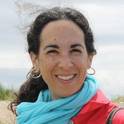| Present | Associate Professor, Montclair State University ‐ Anthropology | |
|
|
||
Disciplines
| 2014 | PhD, University of Arizona ‐ Anthropology | |
|
|
||
| 2002 | MA, University of Iowa ‐ Spanish | |
|
|
||
| 1997 | BA, Illinois Wesleyan University ‐ Spanish and History | |
|
|
||

